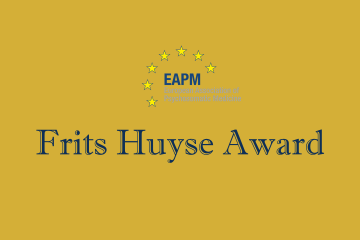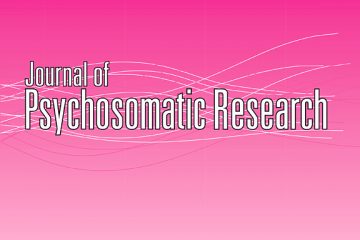The Editor’s choice October 2020
written by Jess G. Fiedorowicz, Editor-in-Chief, Journal of Psychosomatic Research, October 2020

Jess Fiedorowicz, JPR’s Editor-in-Chief
The Editor’s Choice – Written Emotional Expression and Mortality
This quarter I have selected an especially interesting and unique Editor’s Choice from the Journal of Psychosomatic Research. In this paper, Gail Ironson and her colleagues from the University of Miami assessed mortality in a sample of participants with human immunodeficiency virus (HIV) enrolled in a longitudinal study [1]. Between 1997 and 1999, 169 of the 177 participants enrolled in the study wrote an essay about the most traumatic or upsetting experience of their life. They were instructed to write continuously for 20 minutes, as had been done in a prior study from the 1980’s [2]. Participants were additionally encouraged to “really let go” of their “very deepest emotions and thoughts.” It just so happens that how participants approached this simple assignment influenced their subsequent survival. The authors summarize their key findings as follows:
While previous studies suggest expressing emotions may be good for health, the current study extends this literature by determining whether both positive and negative emotions in a single essay recalling the most traumatic event in the lives of 169 people with HIV would predict survival after 17 years. Both positive and negative emotions independently predicted greater survival controlling for CD4 count, viral load, age, antiretroviral medications, gender, race, and education. Those in the top third of emotional expression had nearly four times the survival rate versus the bottom third. Expressing both positive and negative emotions may have benefits for health.
Let’s delve deeper into how this novel exposure was measured. Emotional words were counted by two independent researchers and assigned a valence as positive or negative. The authors demonstrated a high interrater reliability, particularly for positive words. The total number of emotional words was simply the sum of the positive and the negative words. This measure is indeed quite distinct from more traditional studies using self-reported emotions. For this study, what was measured was not the self-report of one’s emotion or the self-report of one’s ability to communicate emotion, but the measured ability to communicate emotions on an essay writing task. After all, in advance of writing the essay, participants were instructed to communicate their emotions.
The mortality outcome was ascertained in 2014, up to 17 years after the baseline assessment with the essay was conducted. As part of an a priori analysis plan, Cox regression models assessed the relation between tertile of expressed emotion and survival, adjusting for several potentially confounding variables, including baseline CD4+ count, viral load, age, use of antiretroviral medications, education, sex, and race/ethnicity. The results were striking as can be seen in the reproduced Figure 1 from the published manuscript.
Fig. 1. Survival curves using Cox regression for total emotional words controlling for biomedical and demographic variables: baseline CD4 count, baseline HIV viral load, age, use of antiretroviral medication, gender, education, and race/ethnicity.
As evident in the figure, those in the highest tertile of emotional expression showed greater survival and the pattern across tertiles suggested a possible dose response. Remarkably, a similar pattern was observed for both negative emotional word count and positive emotional word count. These results are consistent with a 2013 Journal of Psychosomatic Research paper that showed self-reported emotional suppression, an inverse construct to emotional expression, was associated with higher all cause mortality (HR 1.35, 95% CI 1.00-1.82, p=.049) [3].
So, what do these intriguing results mean? In their discussion, Ironson and colleagues review a broader literature on emotional expression and health with a focus on studies of persons living with HIV. One such study was particularly compelling considering the Ironson et al. findings. In this small (n=37) randomized clinical trial, an expressive writing intervention improved viral load and CD4+ counts in those with HIV relative to a control writing condition [4].
The main result of our Editor’s Choice, showing an association between emotional expression and long-term survival, is attention grabbing. The idea of health benefits from emotional expression is one that naturally lends itself to therapeutic interest and speculation. Ultimately, larger trials that test relevant interventions are needed before any such conclusions can be extrapolated to clinical practice. Perhaps the greatest innovation to come from our Editor’s Choice selection relates to having a task-based rather than self-report measure for emotional expression that can be adopted by future studies. Ironson and colleagues add that future research might also be able to discern the relative value of the method of emotional expression, expressive writing in this study, and the content that is being expressed, in this case a prior trauma. It is not clear if verbal communication or expression of emotions related to some other context would be similarly able to predict health outcomes. The journal welcomes submissions of any work designed to answer these interesting questions or to utilize task-based measures of emotional expression in a context relevant to our scope, at the intersection of psychology and medicine.
References:
[1] G. Ironson, L. Bira, E. Hylton, Positive and negative emotional expression measured from a single written essay about trauma predicts survival 17 years later in people living with HIV, J Psychosom Res 136 (2020) 110166. [2] J.W. Pennebaker, S.K. Beall, Confronting a traumatic event: toward an understanding of inhibition and disease, J Abnorm Psychol 95(3) (1986) 274-81. [3] B.P. Chapman, K. Fiscella, I. Kawachi, P. Duberstein, P. Muennig, Emotion suppression and mortality risk over a 12-year follow-up, J Psychosom Res 75(4) (2013) 381-5. [4] K.J. Petrie, I. Fontanilla, M.G. Thomas, R.J. Booth, J.W. Pennebaker, Effect of written emotional expression on immune function in patients with human immunodeficiency virus infection: a randomized trial, Psychosom Med 66(2) (2004) 272-5.
The following article has been selected by our Editor-in-Chief:
Positive and negative emotional expression measured from a single written essay about trauma predicts survival 17 years later in people living with HIV
Gail Ironson, Lindsay Bira, Emily Hylton
Vol. 136, September 2020
Corresponding Author’s Commentary
While previous studies suggest expressing emotions may be good for health, the current study extends this literature by determining whether both positive and negative emotions in a single essay recalling the most traumatic event in the lives of 169 people with HIV would predict survival after 17 years. Both positive and negative emotions independently predicted greater survival controlling for CD4 count, viral load, age, antiretroviral medications, gender, race, and education. Those in the top third of emotional expression had nearly four times the survival rate versus the bottom third. Expressing both positive and negative emotions may have benefits for health.
See this link fyi: https://www.journals.elsevier.com/journal-of-psychosomatic-research/editors-choice/positive-and-negative-emotional-expression-measured



0 Comments